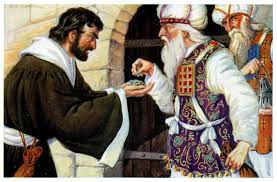HOMILY WEDNESDAY OF HOLY WEEK
Trust the Father and Follow Jesus
(Is 50:4-9; Ps 69; Mt 26:14-26)
*****************************************
“Lord, in your great love answer me.”
This psalm response and the readings today invite us to trust in God the Father as Jesus did, and emulate him who was without sin, by letting go of any sin in our lives, of any ways we might be betraying him still. We are invited to live out the first words Jesus proclaimed as he began his public ministry: repent and believe, for the kingdom of God is near.
Both Isaiah and the psalm reveal prophecies about Jesus fulfilled, in striking detail, like a crescendo, as we approach the Great Triduum. They invite us to place our complete faith and trust in Jesus as the Messiah, Son of God and Savior of all humanity.
Today we have the third Servant Song of Isaiah with its memorable images: Jesus is a teacher who sustains us with his Word; he gave his back to blows; he did not hide his face from insult and spitting; he put his complete trust in God.
Psalm 69 is almost the same as Psalm 22, quoted by Jesus on the cross: insults broke his heart; they gave him vinegar to drink, yet in the end, he praises God, magnifies God’s name, is grateful and glad.
 Turning to the Gospel we hear an echo of an Old Testament prophecy – Jesus would be betrayed for pieces of silver and hear “his time is near.” This is a fourth reference to his “hour” mentioned in the gospels (after the temptations in the desert, the wedding feast at Cana and the Greeks who want to see him). What is striking here is the one who betrays him “dips his hand in the bowl with him,” which is similar to receiving communion from him.
Turning to the Gospel we hear an echo of an Old Testament prophecy – Jesus would be betrayed for pieces of silver and hear “his time is near.” This is a fourth reference to his “hour” mentioned in the gospels (after the temptations in the desert, the wedding feast at Cana and the Greeks who want to see him). What is striking here is the one who betrays him “dips his hand in the bowl with him,” which is similar to receiving communion from him.
Actually, we all “dip our hands in the bowl with Jesus” whenever we receive communion. And like Judas, we have all betrayed him or will betray him, in one way or another, because we are human. We all have a price, and we all sell out to the false gods of possessions, prestige and power. One young person, who was sexually abused as a child but never dealt with it, reacted to her mother’s death by turning to drugs and alcohol, stuck as she was in grief as well as a lot of stuffed anger and shame.
We all sin, in the sense of hamartia – falling short of the persons God has created us to be. Perhaps we all should make Judas’ deceitful question to Jesus our own: “Surely not I, rabbi?” Notice that right after Jesus refers to himself as the “Son of Man,” a reference to the Incarnation and the Word of God made flesh, Judas uses the strictly human term “rabbi,” revealing perhaps even unwittingly his lack of faith in Jesus as divine. That was as great as sin as his betrayal.
The good news, however, is that we are all forgiven. As Presentation of Mary sisters Rita Bisson and the late Raymonde Arcand pointed out, with whom I ministered for years, we are not so much “sinners who are forgiven,” but rather “good people who have sinned” (fallen short of the mark, or hamartia), and are forgiven.
The fullest meaning of the passion and resurrection is that Jesus has forgiven us fully. He has set us free from sin (that which we do) and sinfulness (that which makes us do it – our painful emotions, negative attitudes and addictions), and ultimately death. All we have to do is to trust as he did in the love of the Father, turn to him for forgiveness, try to follow him by not sinning or betraying him anymore, and love as he did.
The saints are those who took this message to heart and truly lived it heroically. They are an inspiration to us.
The Eucharist is a living out of these readings. Jesus our teacher is sustaining us with his word. Having dipping our hand in the bowl through communion, we are then commissioned to go out and spread the Good News of God’s love and forgiveness through our lives of faith, integrity and love.



